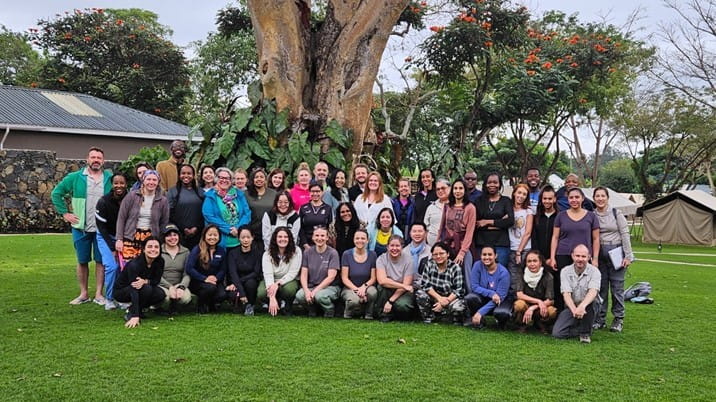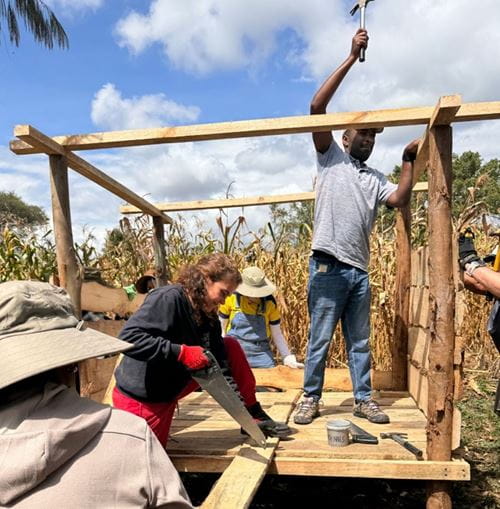We use cookies to improve your online experiences. To learn more and choose your cookies options, please refer to our cookie policy.

Nord Anglia Education’s EDIB Champions recently travelled to the Shamba Kipara Camp just outside of Arusha, Tanzania for our first-ever Equality, Diversity, Inclusion, and Belonging Conference.
The overarching goal of this professional learning experience was to equip EDIB champions from our schools with the foundational skills needed for them to lead in their settings with an understanding of change processes and complexity, while also using data to inform their decision making. Through insightful discussions, hands-on activities, and community engagement, it was a full week of professional learning for our Champions to uncover new ways to further bring to life EDIB principles at their schools.
The conference began with reflections on our personal and professional values, which allowed colleagues to articulate “why” they’re leading this work. This “why” was front of mind during all our workshops and discussions throughout the week.
The Champions discussed values-based leadership, what drives inclusive practices, and how to lead truly meaningful change through school policies. And to create real and meaningful inclusion we asked ourselves: What does success look like in the various countries we operate in? What kind of attitudes and actions do we want to inspire in our students? How can we best support colleagues in fostering an environment that embodies our EDIB values?
It was key for Champions to understand the ongoing work Nord Anglia has been doing in Tanzania’s Usa River community for over a decade now. Guided by Dave Wall, Head of Expeditions, and our partners at Seeway Tanzania, we looked at their efforts to bring quality education (SDG4) to many, including their successes, challenges, and inclusion efforts for neurodivergent students or those with physical disabilities.
This first day set the tone for the entire conference, emphasising how crucial EDIB is for every facet of education. An important takeaway was the importance of relationships in creating change: our relationships with ourselves, each other, those we lead, and the schools we work in.
On the next day, the Champions toured a local business called “Sanaa”, which employs people with physical disabilities, so we could learn about the complexities it has faced and its mission to serve those who may have trouble advocating for themselves.
While here, the Champions explored the inclusion efforts at North Broward Preparatory School and learned about making “cultural intelligence” actionable and visible. Led by Akeem Cedeno and Dr Deanne Reynolds, both teachers and Cultural Intelligence Leads from the school, this workshop gave Champions tried and tested tools to lead sustainable change from within our schools.On the third day, we collaborated with ‘The Foundation for Tomorrow’, a Tanzania-based organisation giving quality education to students and training to educators. We then collaborated with 50 educators from the Arusha community to build strategies for schools to dial in on inclusivity.
The highlight for many on this day was the focus on neurodiversity. Catherine McCluskey, Director of Whole School Learning Support from St. Andrews International School, led a workshop on ‘Adaptive Teaching in the Inclusive Classroom’, offering insights into neuroinclusive pedagogy. This inspired great conversations on inclusive and adaptive teaching and, by the day’s end, we each collaborated on interactive and inclusive training plans to take back to our schools.Similarly, Abigail Alexis-Olubuyide, Head of Primary at The British School of Beijing, Shunyi, gave an "Introduction to Neurodiversity" where she explored how to create a safe space for sharing and learning about the challenges neurodiverse students and colleagues face.

Day four was dedicated to giving back to the local community—in much the same way that Nord Anglia students experience through Seeway as part of our ongoing Tanzanian expeditions.
The Champions directly supported six local families by building goat sheds and installing a solar-powered light systems and smokeless stoves. These families were also gifted goats that will act as a stable source of milk. Spending in the local community and seeing the impact of sustainable initiatives like this were especially powerful.
As you can tell, there was a lot of great learning at the conference. However, a major question we always come back to is: how can we measure our impact and progress?
To make this stick, we introduced the ‘EDIB Journey Map’ to help Champions and their school leadership pinpoint exactly where each school stands. This tool goes beyond a “tick the box” exercise—it’s reflective and hones in on EDIB areas to focus on, along with specific benchmarks to demonstrate growth around how we’re embedding inclusive practices. We even hosted a session called “Making Data Your Ally” focused on evidencing our progress. I’m excited to see how this tool helps us better measure our EDIB efforts across the organisation.